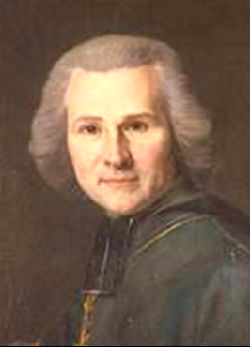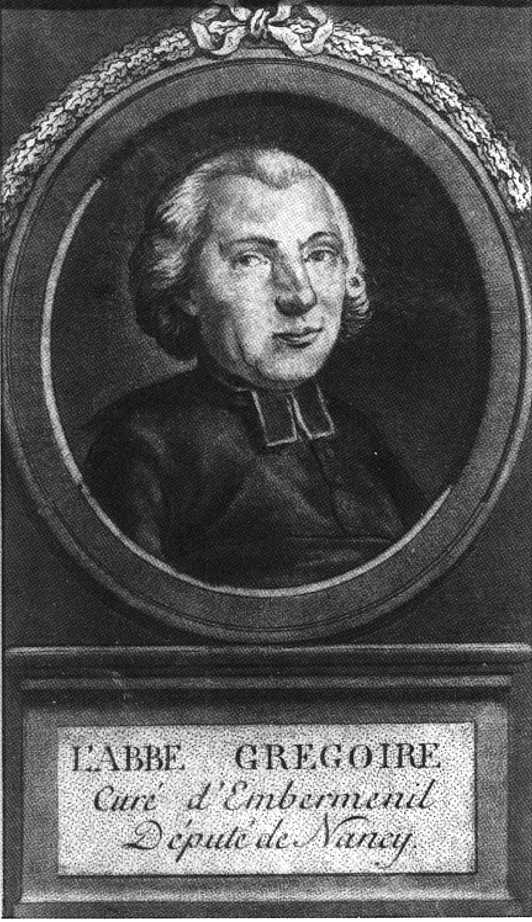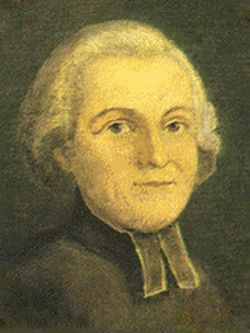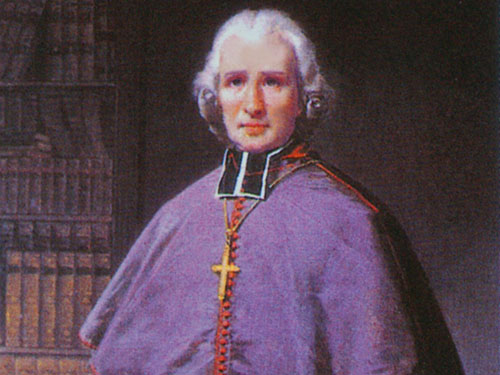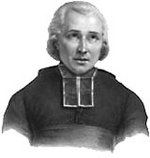Henri Grégoire
Henri Jean- Baptiste Grégoire, Abbé Grégoire also known as ( born December 4, 1750 in Vého, Lorraine, † May 20, 1831 in Paris ) was a French priest, bishop and politician during the French Revolution. He became well known, not least because of the demand for the abolition of slavery.
Origin and political rise
He was the son of a tailor and graduated in the Jesuit College of Nancy. In 1782, he became a priest, from 1783 to the Revolution, he served as pastor in Emberménil.
At the beginning of the Revolution he was elected in 1789 by the clergy in the district ( Bailliage ) Nancy as a member of the Estates General. Even as a revolutionary politician who advocated the abolition of the privileges of the nobility and clergy, he was usually called Abbé Grégoire. In the States General, he was soon a spokesman of the reformorientrierten clergy in the tradition of Jansenist and Gallican ideas. As one of the first members of the clergy, he joined the Third Estate, a little later, the merger of the Estates General was followed by the National Assembly. During the storming of the Bastille, he chaired the meeting of the Assembly and spoke passionately against the enemies of the nation.
Constitutional Bishop
As a church politician Grégoire supported the Civil Constitution of the Clergy, which was adopted in 1790 by the National Assembly. The dioceses of the "constitutional church " were directed from the boundaries of the newly created department in the same year. Grégoire was elected to two départements and then decided to Loir -et- Cher. He took the traditional title of Bishop of Blois and made the first cleric on December 27, 1790 the required oath to the Civil Constitution. Since these reforms against the will of the Pope happened, it was in France at the schism between constitutional and romtreuer Church, the latter fierce persecution was exposed. As a Constitutional Bishop of the Abbé Grégoire made a significant contribution to the organization of the church during the Revolution. He also took a leading role in the national- French Councils of 1797 and 1801.
Political demands
Abbé Grégoire was a member of the Constituent National Assembly. There he advocated to supplement the Declaration of Human and Civil Rights of 26 August 1789 a Déclaration du droit des gens, which should extend the principles of the French Revolution to all peoples. His proposal was based on the state of nature existed between the nations, and a general for this binding morality.
From 1792 to 1794 was Grégoire member of the National Convention. Grégoire advocated the abolition of the monarchy and the condemnation of the king. He considered himself a citizen of the world and was convinced that the abolition of the French monarchy was the first step to unite all peoples. Its position relative to the execution of Louis XVI. however, is controversial. At the time the crucial vote he was absent; later, he insisted repeatedly, to have opposed the execution of the king. He fought strongly for an end to slavery in the colonies, which was abolished by the National Convention in 1794. Even before the Revolution, he had come for the emancipation of the Jews. Of the Jews, he demanded in return the linguistic assimilation (see closer to the history of Jews in France).
Is controversial to this day his radical attitude to push back from the state all deviating from the Parisian high-level language for Regional or Minority Languages . On June 4, 1794, he presented to the National Convention a report in which he demanded the suppression of the " dialects " and the exclusive use of French. The associated measures initiated a long-term policy, which led to the decline of the regional languages, including the Occitan.
Career after 1794
Even after the 9th Thermidor and the end of the radical phase of the revolution remained Grégoire worked as a politician. In 1795 he became a member of the created by the new Constitution Council of Five Hundred. After the coup of 18 Brumaire (9 November 1799) he became a member of the Corps Législatif and then in 1801 a member of the Senate. Grégoire proved in the following years as a political opponent of Napoleon and denied the policy of reconciliation with the Holy See by the Concordat of 1801. Grégoire then submitted on October 8, 1801 his bishop resigned. Despite his criticism of the proclamation of the Empire and the establishment of a Napoleonic nobility, he was appointed Commander of the Legion of Honour and Count.
Transition into exile and later life
In the later period of the reign of Emperor Napoleon, he went into exile in England and Germany. In 1814 he finally returned to France and settled during the rule of the Hundred Days, not by his opposition to Napoleon from. In the time of the Restoration Grégoire was again as a revolutionary and former schismatic bishop. He was expelled from the Institut de France and forced to retreat into private life. As a political critic, however, he retained his influence.
Towards the end of his life he was impoverished and forced his library for sale. His remains were moved in 1989 to the Panthéon.





